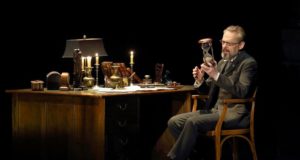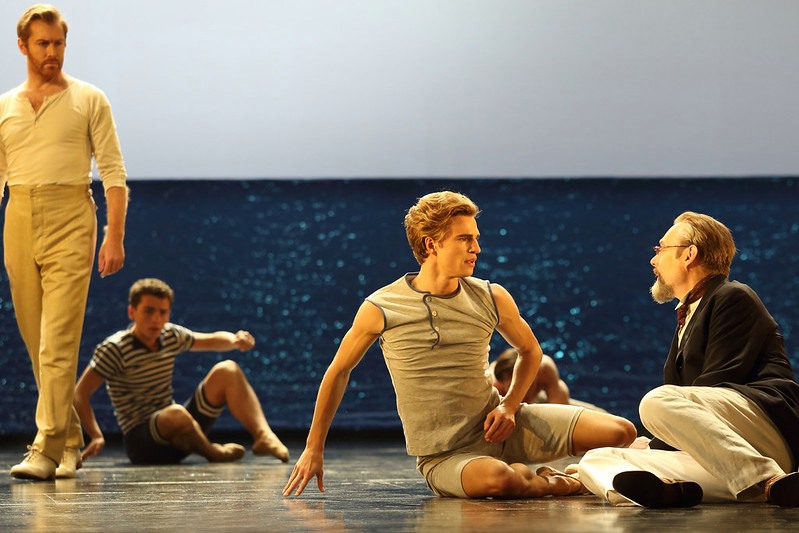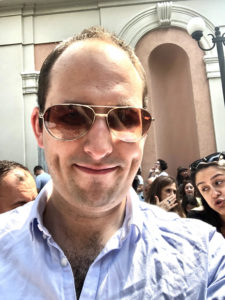
Royal Opera House 2019-20 Review: Death in Venice
Mark Padmore & Gerald Finley Are Otherworldly in Britten Masterwork
By Benjamin Poore(Credit: Catherine Ashmore)
David McVicar’s new production of Britten’s late masterpiece “Death in Venice” is a brooding and elusive meditation on the tribulations of aging creativity and its relationship to death and desire. Peter Pears confided that “Ben is writing an evil opera, and it is killing him,” which no doubt prompts cured autobiographical readings of the work.
But here they are tastefully eschewed in the work’s first representation at Covent Garden in 25 years.
Intense Inwardness
At the center of this performance was Mark Padmore’s implacable Aschenbach. That he was untiring across its two-and-a-half-hour span is the least remarkable thing about it. His voice now finds itself in a place that cultivates richer and riper colors in the lower register, giving his performances a careworn dignity balanced by an upper register that is alchemical in its production of colors and textures.
One of the challenges of this opera comes from its intense inwardness. Aschenbach’s extensive rumination was elaborated onstage in recitative passages scored with woozy, spectral dissonances in the piano, music that seems to summon both Messiaen and Britten’s own uneasy settings of Purcell. There was a risk of losing the work’s scant dramatic momentum, but Padmore’s approach was to tread a vocal and technical tightrope in each one, unleashing a mesmerizing box of technical tricks. Padmore exhibited masterful dynamic control, creamy masterclass-perfect messa di voce, austere brightness, and hollow ghostliness (redolent, naturally, of Pears). We often got all of the above within the space of a few words.
The care Padmore put into the sculpting of individual words was almost dizzying. His “renewal” at the climax of the first half springs to mind – pulling out the emotional ambiguities that hover over the text with a voice ardent then fragile. His Aschenbach was fragile, sometimes sentimentally girlish, other times potent and confident, bursting with creative – if not quite erotic – vigor.
If this were an opera whose dramatic screw needed continuous tightening then Padmore’s rather luxurious – one is almost tempted to say indulgent – examination of his battery of vocal timbres would sink the show. But instead it was a perfect musical reflection of Aschenbach’s own retreat into an abstruse formalism in his work, which imbues him with an aura of brilliance that is blinding but isolating. His voice is a perfect vehicle for the “austere demands of maturity.”
It is a performance that should stand as a career highlight.
Physically it was well-judged as well: stiff and bourgeois with one hand behind his back at the outset (“I, Aschenbach, famous as a master-writer, successful, honoured”). But as Venice and Tadzio worked on him, this gave way to a looser, more expressive physicality, which finally left him crumpled in darkness against a pillar after an astounding “Phaedrus” monologue, where he bid farewell to life. So too did we feel in his posture vulnerability and shame as the troupe of Players round on him humiliatingly midway through act two (“Ha ha! Ha ha! How ridiculous you are,” they spit).

(Credit: Catherine Ashmore)
Chameleon
Padmore’s counterpart was baritone Gerald Finley, whose chameleon-like vocal inventiveness was an uncanny foil. Finley’s role encompasses the mysterious harbingers of mortality and decay, all flame-haired, that Aschenbach meets: the traveller, the aging fop on the ship, the crooked gondolier, the oily hotel manager, the obsequious barber, and the gross leader of a troupe of players. Singing aside, costume changes of this efficiency are a theatrical feat themselves.
The vocal variety Finley brought to each of these roles made it hard to tell that it was the same singer we kept seeing. Britten’s musical and operatic pastiches that haunt his entries were delivered with brilliant acuity and inventiveness.
Most unearthly was Finley’s falsetto, which was so pure and even he could pass as a countertenor. As a ghostly echo of Padmore’s own upper reaches, it appeared as cruel and mocking mimicry, particularly as the aging fop. As the oleaginous hotelier his voice was viscous and cloying, like spoiling cream.
Lynne Page’s choreography shuttled between an earthy, healthy naturalism and more abstract and classical gestures, deployed to special effect in the tableau of games played at the Lido.
Leo Dixon’s Tadzio was rather more grown-up than a more invasive reading of the text might imply, and his pronouncedly adult poise and robustness perhaps dialed back the more transgressive and taboo impulses that we know linger in both opera and novella.
It is luxury casting all round in the large supporting ensemble, with cameos from Rebecca Evans as the Strawberry Seller and Hanna Hipp as the German mother.
Unrealized
Myfanwy Piper’s libretto is left to do much of the work in the production. Here McVicar’s restrained sets and sparing use of props pays an expressive dividend in ways that it has not elsewhere, which can feel unrealized (his much-revived “Nozze di Figaro” a case in point).
A scrim separates front and rear portions of stage, which serves to separate Aschenbach’s interior from the external action, and he meets Finley’s various avatars almost precisely on the border between it. The gauze also suggests the blurry photographic surface of the images of Venice that appear in the program book and shape the production’s aesthetic, reminding us of not only the importance of looking in the opera (against the unbearable intimacy of touching), but also that what we witness is the partly a Freudian projection of Aschenbach’s imagination and desire (“It is as if I created him myself,” he remarks of Tadzio).
Lighting by Paule Constable fills out this relatively stark staging with dynamic chiaroscuro. Guttering candles glint off Aschenbach’s hourglass at his dingy desk; the first act closes with a blaze of glittering light after the games on the beach. These contrasts are heightened in speed and vehemence as the second act unfolds, and as Aschenbach is drawn deeper into his troubled battle between Apollonian and Dionysian impulses. But it’s nothingness that Aschenbach craves, and where the show ends up: Tadzio’s final spins, as Aschenbach slumps dead on the beach, dissolve into darkness.
This abyssal pull is reflected in the backdrop, a limitless grey horizon cut by glittering blue sea – a rather literal version of what Mann’s contemporary Freud would call the “Oceanic feeling.” It bisects the stage at such a height that it always, rather miraculously, separates the heads of characters from their bodies, which elegantly mirrors the head and body conflict of Apollo and Dionysus that is at the heart of the work.
Sleek sepulchral columns glide across the stage to usher in changes of setting, and form increasingly complex and claustrophobic configurations, as Aschenbach becomes ever more lost in Venice’s sickly maze.
Much of the show’s drama is interior, not spectacular – notwithstanding the first shrouded appearance of Aschenbach’s funeral gondola, in a billowing fug of dry ice – but we didn’t entirely lack for the latter.
The final tableau of Act one featured the Royal Opera Chorus on adjacent sides of the auditorium – eerily offstage for most of the rest – ritualistically wafting Britten’s vocal lines between them, as dancers onstage made bold and graphic shapes straight from Matisse. The voice of Apollo, overseeing the Olympiad, is sung by a countertenor and here presented as hunky personal trainer.
Britten’s score is one of his most diverse and enigmatic. The percussion ensemble, with its gamelan flavor, accompanied Tadzio’s movements with cool, bleached timbres, exemplifying his elevated essence, and could be straight out of Messiaen; its more violent, Bacchic outbursts were spiked with untuned drums and almost presage Harrison Birtwistle. They sit audibly apart form the rest of the orchestra, whose lusher and more Mahlerian interludes were wrung out with emotional force. Britten’s guttural orchestration, with coiled bassoons and bass clarinet, had all the requisite summer stink and ominous grandeur of the city.
Richard Farnes was an unobtrusive conductor who led the musicians through the score with calculated transparency – just as cleanly formalist as Aschenbach – and the faltering fanfare of the opening and the work’s limping interludes were characterized by rhythmic exactitude and textural clarity, particularly when navigating the score’s chamber-scale arrangements. Farnes’ detachment was impressively precise, and those who have tipped him to succeed Antonio Pappano would be able to point to this performance with confidence.
But with only a parsimonious five performances on offer, seeing this sellout show might prove as elusive as Tadzio himself.



